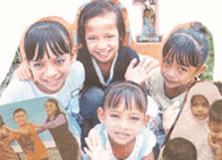
November 22, Kuala Lumpur, Malaysia —
JusticeMakers Fellow Dato’ Yasmeen Shariff met with the Minister of Information, Communications and Culture Dato’ Seri Utama Dr. Rais Yatim at his Federal office in Kuala Lumpur on November 22, forging a critical partnership to help revamp Malaysia’s juvenile justice system. This meeting lasted only a half an hour, but has been years in the making, and symbolized the union of two otherwise disparate cultures – law and the arts – in the hopes of transforming the future of Malaysia’s forgotten youth.
They have devised a plan to introduce arts education into detention centers and homes for youth, with the aim of sparking an artistic interest in children who have yet to find other outlets and inspirations.
Dato’ Rais has agreed to devote resources to bringing in teachers trained in the arts and music into these places of detention, and offered to donate musical instruments and art supplies. He even suggested giving especially talented children airtime on national television, which could inspire artistic creativity in youth onlookers similarly teetering on the edge of delinquency.
When Dato’ Yasmeen first discovered children as young as ten years old in prison in early 2000, she knocked on every government door she could access with little or no success. But for Dato’ Rais, who was appointed Minister in the Prime Minister’s Department at the time, the government would have never acknowledged this embarrassing reality.
Dato’ Yasmeen cornered Dato’ Rais at a public function, leaving him no other choice but to listen to the shocking stories of children in such conditions. After this initial impromptu meeting, Dato’ Rais, also a former lawyer, offered Dato’ Yasmeen an inroad into government territory, one that resulted in the release of the aforementioned juvenile detainees and conception of a Juvenile Justice Task Force within the Kuala Lumpur Bar.
But the plague of inertia, which far to often paralyzes advocacy movements, infected these reform efforts. Dato’ Yasmeen stepped down as a member of the Kuala Lumpur Bar Committee, and her Juvenile Justice Task Force fizzled away. She shifted her focus towards her private practice, and the vacuum of leadership generated by her departure was never sufficiently refilled.
Yet both Dato’ Rais and Dato’ Yasmeen remained in touch. They occasionally crossed paths during NGO gatherings and government functions, and reminisced about the time they spent together on the frontlines of juvenile justice reform.
Only recently did they re-forge a formal relationship through their professional capacities, similar to the one developed back in 2000. However, this time around, the stakes are higher, and the focus has shifted.
Dato’ Yasmeen, empowered through her 2010 JusticeMakers fellowship, is currently working to formalize a policy of diversion for petty juvenile offenses, which will offer a spectrum of tailor-made alternatives to detention for children who come into conflict with law. And Dato’ Rais is now Malaysia’s Minister of Information, Communications and Culture, armed with a full arsenal of federal government funding, resources and tools.
But his motivation is no longer exclusively, or even primarily, legal. He is now concerned with promoting culture through communication outlets to enable all Malaysians to participate in cultural activities, such as the arts.
Dato’ Yasmeen is looking for innovative methods to rehabilitate children without placing them to detention facilities; and Dato’ Rais is constantly trying to search out new avenues to encourage cultural participation from typically marginalized communities. Herein lies the point of intersection: the arts.
“If other troubled children see their peers on television having fun with arts, this will show them that there are options other than hanging around the street and playing truant,” argued Dato’ Rais. “We must offer our children societal outlets that are interesting to them, not just our generation.”
The specifics of this program are still in the works, and won’t be fully hashed out until after research is conducted over the next couple of months. But Dato’ Yasmeen can’t help but imagine the potential of such a partnership.
“While working with kids in detention centers is of high priority, we also want to reach children that have not yet gotten there – the children that are looking for an outlet and a way to express themselves, but currently have no options. And if we don’t do anything, these are the next group of kids we will see institutionalized and in detention centers.”
“This is why we need to promote arts more in community centers, and why I have included the arts in my [JusticeMakers] project to implement alternatives to detention for youth. ”
Dato’ Yasmeen hopes to develop a Memorandum of Understanding (MOU) with this current Ministry to lay the framework for a long-lasting partnership, and ensure the continuation of the program long after she and Dato’ Rais have retired.
Reflecting on this meeting hours after it took place, Dato’ Yasmeen admits that utilizing the arts was not an option that she seriously considered when she first met Dato’ Rais.
“As our society rapidly changes and connects in new ways, we have to constantly look for new methods to reach our children. And that is what Dato’ Rais and I are trying to do. I might not have thought about it ten years ago [when I first got involved in juvenile justice] but now the arts have the potential to be one of the focal points of my project.”
This adaptability is crucial when dealing with children, states Yasmeen, and one of the reasons innovative alternatives to detention are so imperative. It’s just good that someone else realizes this fact, and even better that someone else is longtime friend and current Minister of Information, Communications and Culture Dato’ Rais.